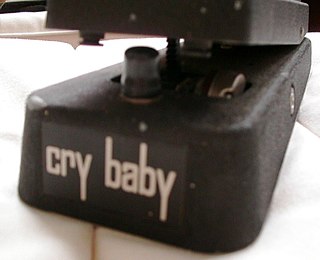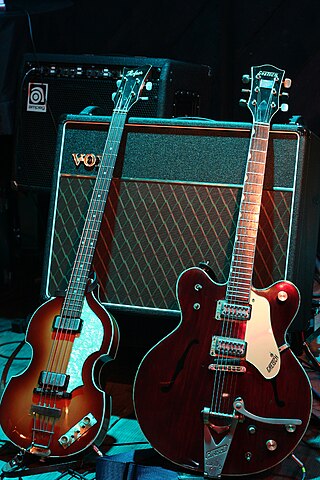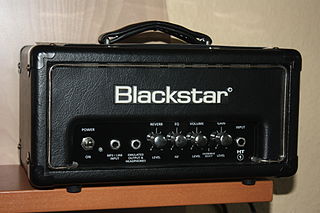This article needs additional citations for verification .(December 2009) |
Jennings Musical Instruments is a manufacturer of musical instruments, and the original owner of the Vox brand. The company was founded by Thomas Walter Jennings.
This article needs additional citations for verification .(December 2009) |
Jennings Musical Instruments is a manufacturer of musical instruments, and the original owner of the Vox brand. The company was founded by Thomas Walter Jennings.
The Jennings Organ Company was founded by Thomas Walter Jennings in Dartford, Kent, England in 1950. Jennings' first successful product was the Univox, an early mains powered electronic keyboard with built-in valve amplifier and loudspeaker, similar to the Clavioline. There is some debate over whether the Clavioline or Univox was used in the song Telstar, but many think that it was the latter.
In 1956 Jennings was shown a prototype guitar amplifier made by Dick Denney, a big band guitarist and workmate from WWII. Denney was going deaf and invented the Vox amp so that he could still hear himself play. Richard Mann, a friend of Dick's drew up the first blueprints, which were presented to Jennings of Bexleyheath. Dick Denney received very little for his invention but continued to design from a workshop built in the garden of his council house in Erith, Kent. The company was renamed Jennings Musical Industries or JMI, and in 1958 the 15-watt Vox AC15 amplifier was launched, and was popularized by The Shadows and other British rock 'n' roll musicians. Its more famous product, AC30 was launched in 1959, and later used by The Beatles on their first two albums.
In 1964 Tom Jennings, in order to raise capital for JMI's expansion, sold a controlling interest in JMI to the Royston Group, a British holding company, and sold American rights to the California-based Thomas Organ Company. Displeased with the direction his old company was taking, he left the company in 1967, roughly the same time that Marshall overtook Vox as the dominant force in the British guitar amplifier market. While Royston's Vox Sound Equipment division set up new operations in the Kent town of Erith, Jennings set up a new company in his old Dartford location, joined later by Dick Denney. Jennings Electronic Industries operated for several years, making an updated and rebadged version of the AC30 along with other amplifiers, as well as a new range of organs.
The Tom Jennings-led JMI Company folded in 1968 and the brand lay dormant for almost 30 years.
In 1997, Richard and Justin Harrison, then owners of Hiwatt amplification UK and Music Ground Ltd, purchased the "JMI" trademark. At the time the Vox brand was owned by Korg, and unlike the Korg Vox amplifiers being manufactured then, the Harrisons wanted to make exact reproductions of the original Jennings-Denney designs.[ citation needed ]
In early days of the new JMI, a small number of 50W and 100W hand-wired heads were produced, as well as cabinets, to test the waters for a re-launch. As the Hiwatt brand grew larger, the desire to produce the JMI amplifiers grew stronger and stronger; many of the Harrisons' regular customers were asking on a monthly basis when the amplifiers were to be manufactured for general sale.[ citation needed ]
The pivotal point of the JMI rebirth was the meeting of amplifier engineer and JMI enthusiast Steve Giles with co-owner Richard Harrison. Giles had previously built amplifiers based on Jennings’ designs, which impressed Richard Harrison to such an extent that some prototype models were made.
In 2005 the company decided to make models JMI 15/4, JMI 30/4, JMI 30/6 and the JMI 30TV Front. The amps were made available in the classic black, smooth tolex and a 100% replica of the original fawn tolex. Other options included a choice of speakers, either Celestion Greenback or JMI (Fane made) Blue Alnico Speakers. A new JMI gold logo adorned the front of the cabinets, completing the product made to the original Jennings/Denney specifications.
After positive feedback[ citation needed ] from a sample amplifier taken to the Namm show of 2006 the amplifiers were launched for general sale in the March of that year, showcasing at the Frankfurt Musikmesse at the end of March 2006. Also, as an added option, the company offered a rear-mounted top boost on all 30W models.
The company was asked to revive other classic models such as the 4W combo, 15 Twin, 50W head, 100W head and cabinets which came into production in 2007 (showcased at the Namm 2007). Since the rebirth the new JMI amplifiers have found their way into the hands such as Noel Gallagher, and Billy Gibbons.
In late 2008 JMI launched two fx pedals to accompany their range of handmade products. These were the MKII Tone Bender and Treble Booster. The MKII Tone Bender featured a cast chassis as per the original and used New Old Stock Mullard OC-75 Transistors. The Treble booster was to feature a circuit based on the famous Dallas Rangemaster using an OC-44 NOS transistor. Early examples of each pedals are simply spray painted (around 50 Units); later they were powder coated which looked much more authentic to the original. Early packaging was a simple box rubber stamped Tone Bender with a cloth bag also stamped with the same brand. Later examples have the white box with Dallas Style Tone Bender Stickers on the outer and come with a photocopied leaflet of the pedals.
Inside, the pedals were marked either SG, NB or KM: SG Standing for Steve Giles, NB being Nick Browning and KM denoting Kee Mayer, JMI Engineers from Doncaster, England.

Vox is a British musical equipment manufacturer founded in 1957 by Thomas Walter Jennings in Dartford, Kent, England. The company is most famous for making the Vox AC30 guitar amplifier, used by The Beatles, The Rolling Stones, The Kinks, The Yardbirds, Queen, Dire Straits, U2, and Radiohead; the Vox Continental electric organ, the Vox wah-wah pedal used by Jimi Hendrix, and a series of innovative electric guitars and bass guitars. Since 1992, Vox has been owned by the Japanese electronics firm Korg.

A wah-wah pedal, or simply wah pedal, is a type of effects pedal designed for electric guitar that alters the timbre of the input signal to create a distinctive sound, mimicking the human voice saying the onomatopoeic name "wah-wah". The pedal sweeps a band-pass filter up and down in frequency to create a spectral glide. The wah-wah effect originated in the 1920s, with trumpet or trombone players finding they could produce an expressive crying tone by moving a mute in, and out of the instrument's bell. This was later simulated with electronic circuitry for the electric guitar when the wah-wah pedal was invented. It is controlled by movement of the player's foot on a rocking pedal connected to a potentiometer. Wah-wah effects may be used without moving the treadle as a fixed filter to alter an instrument’s timbre, or to create a "wacka-wacka" funk-styled rhythm for rhythm guitar playing.

The clavioline is an electronic analog synthesizer. It was invented by French engineer Constant Martin in 1947 in Versailles.

Guitar Organ or GuitOrgan is a type of electric guitar with electronic organ components added, developed by Jennings Musical Industry as Vox Guitar Organ at latest in 1965. Similar instrument, GuitOrgan was developed by Murrell Electronics, circa 1967. On this type of instruments, each guitar fret is separated into six segments, creating independent contact switches for each string. The organ notes are keyed when a string touches a specific segment. An expression pedal is used to fade the organ sound in and out, while the guitar can be played at the same time.
Univox was a musical instrument brand of Unicord from the early 1960s, when they purchased the Amplifier Corporation of America of Westbury, New York, and began to market a line of guitar amplifiers. Univox also distributed guitars by Matsumoku, effects units by Shin-Ei Companion, and synthesizers by Crumar and Korg.

Marshall Amplification is a British company that designs and manufactures music amplifiers and speaker cabinets. Founded in London by shop owner and drummer Jim Marshall, the company is based in Bletchley, Milton Keynes, England. Since March 2023, Marshall Amplification has been one of several divisions of the Swedish conglomerate, the Marshall Group.

Joel Michael Stroetzel is an American musician, best known as the rhythm guitarist from the Massachusetts metalcore band Killswitch Engage.

Kustom Amplification or Kustom Electronics is a manufacturer of guitar and bass amplifiers and PA equipment and accessories. Since 1999, Kustom has been owned by the Hanser Music Group headquartered in Cincinnati, Ohio.

Hiwatt is a British company that manufactures amplifiers for electric guitars and electric basses. Starting in the late 1960s, together with Marshall and Vox, Hiwatt contributed to the sonic image popularly termed "British sound".

The Vox AC30 is a guitar amplifier manufactured by Vox. It was introduced in 1958 to meet the growing demand for louder amplifiers. Characterised by its "jangly" high-end sound it has become widely recognized by British musicians and others, such as George Harrison and John Lennon of the Beatles, Bill Wyman of the Rolling Stones, Brian May of Queen, Dave Davies of the Kinks and Hank Marvin.

The Vox Continental is a transistorised combo organ that was manufactured between 1962 and 1971 by the British musical equipment manufacturer Vox. It was designed for touring musicians and as an alternative to the heavy Hammond organ. It supports drawbars in a similar manner to the Hammond, and has distinctive reverse-coloured keys. The sound is generated by a series of oscillators, using a frequency divider to span multiple octaves.
A combo organ, so-named and classified by popular culture due to its original intended use by small, touring jazz, pop and dance groups known as "combo bands", as well as some models having "Combo" as part of their brand or model names, is an electronic organ of the frequency divider type, generally produced between the early 1960s and the late 1970s. This type of organ predated, and contributed largely to, the development of modern synthesizers. The combo organ concept, at least in the context of mass-production, is thought to have arisen from popular demand, when smaller home organs were seen in music stores. Combo organs were probably originally developed in the United Kingdom, based on the Univox polyphonic version of the Clavioline, and some models included the inner-workings of Italian-made transistor accordions. They were the brainchild of necessity for portable organs of simple design, mainly for use in these small groups. Combo organs ended up having a major impact on the music scene of the mid- and late 1960s, particularly on rock and roll of that era.

This is a history of the equipment that the English rock band The Who used. It also notes their influence on the instruments of the time period.
Thomas Walter Jennings was an English businessman who was the founder of Jennings Organ Company. In 1950 he formed Jennings Musical Instruments (JMI) Ltd, the company that produced the famous Vox Guitar amplifiers. In 1956 the company name was changed to Jennings Musical Industries Ltd. Disenchanted with the company direction, he left JMI Ltd in 1967 and set up a separate company, Jennings Electronic Industries.

John Lennon's musical instruments were both diverse and many, and his worldwide fame resulted in his personal choices having a strong impact on cultural preferences.
Del Casher is an American guitarist and inventor. He invented the wah-wah pedal, the Ecco-Fonic, and the Fender Electronic Echo Chamber. He was the first to introduce the Roland Guitar Synthesizer for the Roland Corporation.

Blackstar Amplification is a British company that produces and manufacturers guitar amplifiers and effects units. The company was founded by a group of ex-Marshall employees, most notably Bruce Keir, who became technical Director at Blackstar, and former Chief Design Engineer at Marshall, Ian Robinson. In 2009 the company began operations in the United States. The majority of the research and development for Blackstar is carried out in the UK. Blackstar is endorsed by major artists like Ozzy Osbourne, Neal Schon, Opeth, and Richie Sambora of Bon Jovi. Blackstar has been consistently ranked amongst the best amplification brands by leading guitarists. Bruce Keir died in September 2021 at the age of 60.

Tone Bender is the name of several fuzz distortion effect pedals.

Vintage musical equipment is older music gear, including instruments, amplifiers and speakers, sound recording equipment and effects pedals, sought after, maintained and used by record producers, audio engineers and musicians who are interested in historical music genres. While any piece of equipment of sufficient age can be considered vintage, the term is typically applied to instruments and gear from the 1970s and earlier. Guitars, amps, pedals, electric keyboards, sound recording equipment from the 1950s to 1970s are particularly sought after, while musical equipment from the 1940s and earlier is generally far more expensive and sought out mainly by museums or collectors to preserve historical equipment, rather than to perform with.
The Vox AC50 is a guitar amplifier head and accompanying speaker cabinet manufactured by Vox. It was introduced in 1964 to meet the growing demand for louder amplifiers during the British Invasion era of rock and roll live performances. Most notable performers that used the AC50 was The Beatles as well as several other British pop rock bands during the mid to late 60's.